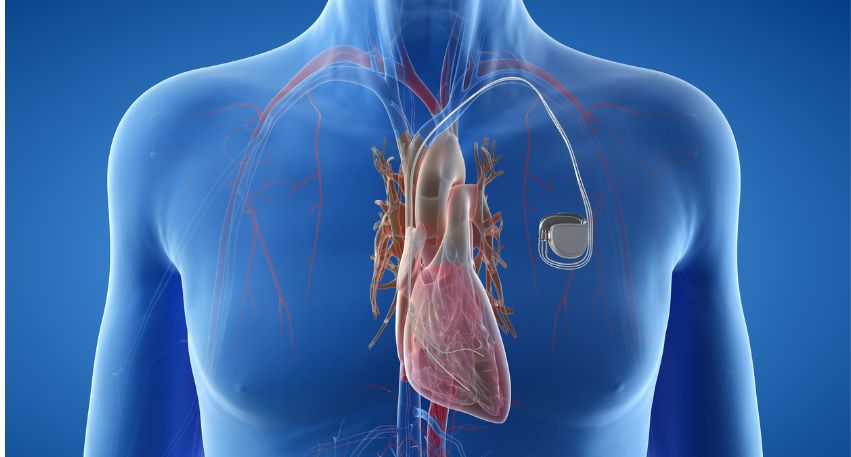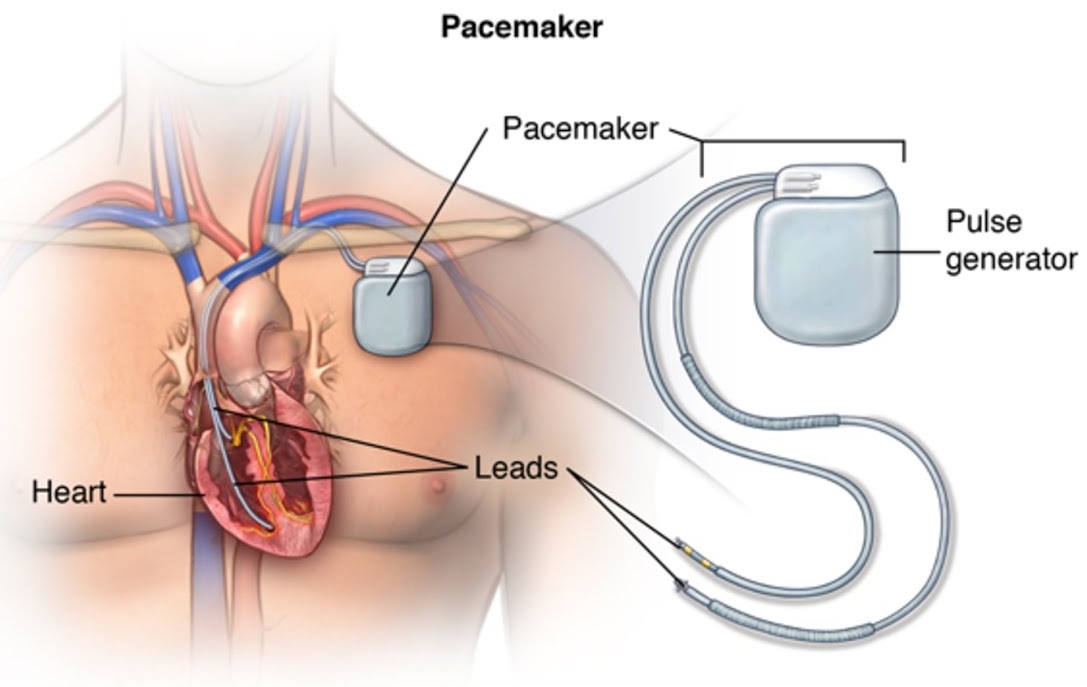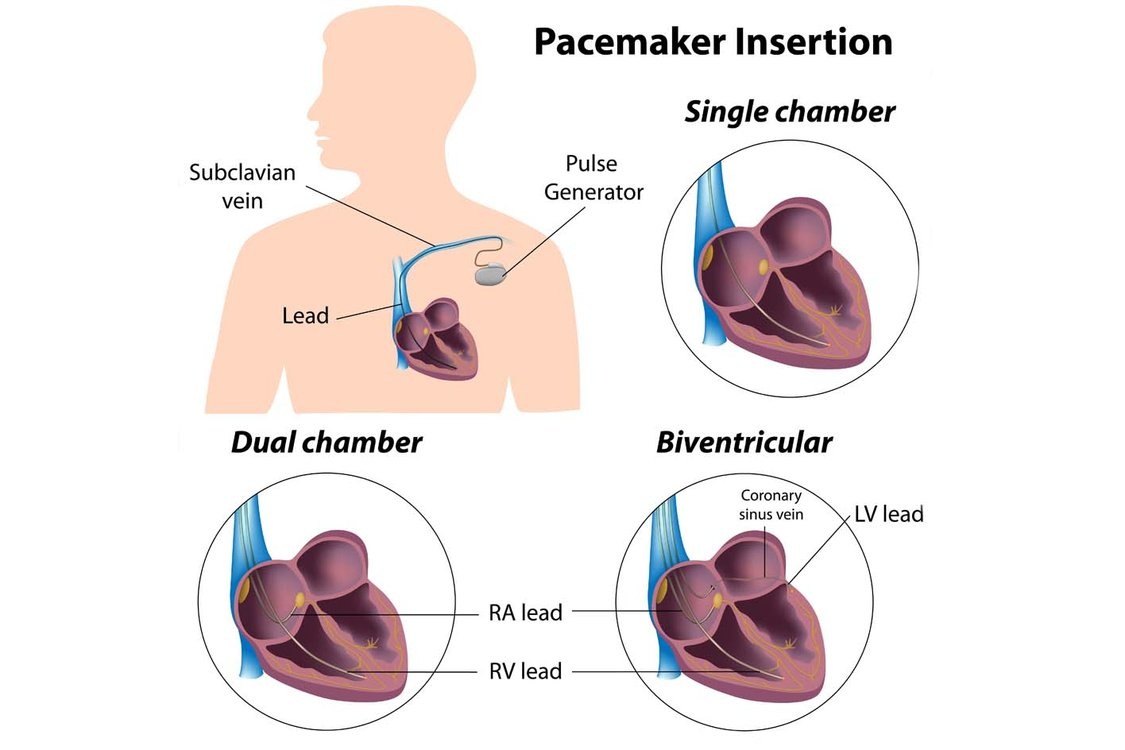Pacemaker Implantation
Pacemaker Implantation in Andheri, Mumbai

Looking for Pacemaker Implantation in Andheri, Mumbai? Dr. Sanjeev Rajdev is a leading expert in Pacemaker Implantation in Andheri, Mumbai at Rajdev Mediclinic. Get advanced cardiac care and optimal results for your heart health. Book your appointment for Pacemaker Implantation in Andheri, Mumbai today!
What is Pacemaker Implantation?
Pacemaker implantation is a surgical procedure to implant a small, battery-powered device called a pacemaker under the skin, usually in the chest. This device helps regulate the heartbeat when it's too slow, too fast, or irregular.
Parts of a Pacemaker
- Pulse Generator: This is a small metal case containing the battery and the electronic circuitry that controls the pacing.
- Leads (or Electrodes): These are thin, insulated wires that connect the pulse generator to the heart muscle. They deliver electrical impulses to the heart and also sense the heart's natural electrical activity.

Why is Pacemaker Implantation Necessary?
Pacemakers are implanted to treat various heart rhythm disorders (arrhythmias), most commonly:
- Bradycardia: A slow heart rate. This can cause symptoms like dizziness, fainting, fatigue, and shortness of breath.
- Heart Block: A condition where the electrical signals in the heart are delayed or blocked, disrupting the normal rhythm.
- Sick Sinus Syndrome: A condition where the heart's natural pacemaker (the sinoatrial node) doesn't function properly, leading to alternating slow and fast heart rates.
- Certain Arrhythmias: Some fast heart rhythms can also be managed with pacemakers.
The Procedure for Pacemaker Implantation:
Before the Procedure
- Medical History and Physical Exam: The doctor will review your medical history, current medications, and perform a physical examination.
- Tests: You may undergo an electrocardiogram (ECG), echocardiogram, and blood tests.
- Medication Adjustments: You might be asked to stop certain medications, like blood thinners, before the surgery.
- Fasting: You'll likely need to fast for several hours before the procedure.
During the Procedure
- Anesthesia: The procedure is usually done under local anesthesia with sedation, meaning you'll be awake but relaxed and won't feel pain. General anesthesia might be used in some cases.
- Incision: A small incision is made, typically just below the collarbone.
- Pocket Creation: A small pocket is created under the skin and muscle to house the pulse generator.
- Lead Placement: Using X-ray guidance (fluoroscopy), the leads are carefully threaded through a vein into the heart chambers.
- Generator Connection: The leads are connected to the pulse generator.
- Testing: The pacemaker's function is tested to ensure it's delivering appropriate pacing and sensing the heart's rhythm correctly.
- Closure: The incision is closed with stitches, and a sterile dressing is applied.
After the Procedure
- Recovery: You'll be monitored in a recovery area for a few hours. Most people can go home the same day or the next day.
- Activity Restrictions: You'll be advised to avoid strenuous activity and lifting your arm on the side of the implantation for a few weeks.
- Follow-up: You'll have follow-up appointments to check the pacemaker's function and the incision site.
Types of Pacemakers
- Single-Chamber Pacemaker: Uses one lead, either in the right atrium or the right ventricle.
- Dual-Chamber Pacemaker: Uses two leads, one in the right atrium and one in the right ventricle, allowing for more coordinated pacing.
- Biventricular Pacemaker (Cardiac Resynchronization Therapy - CRT): Uses three leads, one in the right atrium, one in the right ventricle, and a third lead placed on the outside of the left ventricle. This type is used for heart failure patients to help the ventricles contract in a more synchronized way.


Dr. Sanjay Rajdev
MD, DNB, DM, FACC — Consultant Cardiologist
- MBBS, MD (Medicine) — Gandhi Medical College and Hamidia Hospital, Bhopal
- DM (Cardiology) — Seth G.S. Medical College and King Edward VII Memorial Hospital, Mumbai
- Fellowships in Interventional Cardiology at the University of Alabama at Birmingham & Mount Sinai Medical Centre, New York, USA
Why Choose Dr. Sanjay Rajdev for Pacemaker Implantation in Andheri?
- Central location in Mumbai for easy accessibility
- State-of-the-art cardiac care facilities in Andheri
- Expertise of Dr. Sanjeev Rajdev, renowned for Pacemaker Implantation in Andheri
- Personalized patient care and follow-up in Andheri, Mumbai
FAQ
Who is a candidate for pacemaker implantation ?
Candidates for pacemaker implantation include individuals with bradycardia (slow heart rate), certain types of arrhythmias, heart block, or other cardiac conditions that affect the heart's electrical conduction system.
What are the benefits of having a pacemaker ?
How long does a pacemaker last ?
What precautions should be taken after pacemaker implantation ?
What should I do if I experience symptoms like dizziness or palpitations after pacemaker implantation ?
Where can I get Pacemaker Implantation in Andheri?
Regular check-ups and adherence to post-operative instructions are crucial for managing a pacemaker and ensuring its optimal function. Dr. Sanjay Rajdev is an excellent cardiologist who will help you improve your life quality if you are struggling with heart rhythm disorders. He is an expert in pacemaker implantation. It is a life saving procedure and Dr. Rajdev make sure that it is performed without fail.

